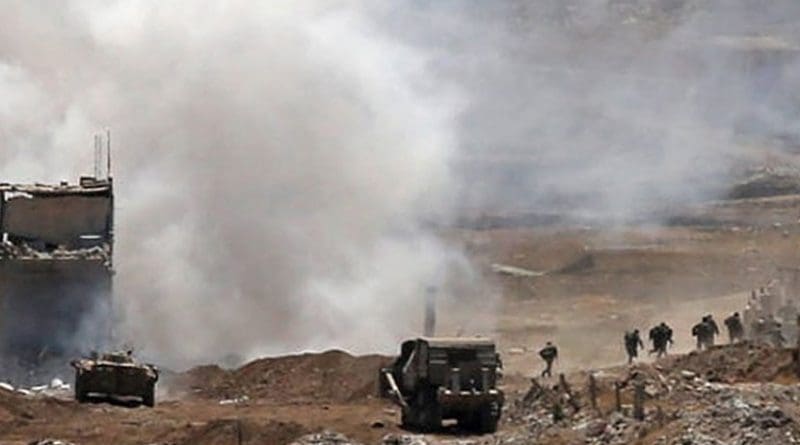The Politics Behind Humanitarian Aid Efforts In Idlib – Analysis
The battle for Idlib is setting the stage for a humanitarian race to help people in the city and its surrounding areas. The UN has warned of the “worst humanitarian catastrophe” of the 21st century.
According to the UN Office for the Coordination of Humanitarian Affairs (OCHA), the military escalation in Idlib over the past 10 days has resulted in at least 30,000 people fleeing their homes in opposition-held territories in northwest Syria.
In the Levant, humanitarian aid programs are politicized, whether officials like it or not. In this sense, the humanitarian response in Idlib will be a telling indicator of the future for Syria. The OCHA is preparing for a flow of refugees in multiple directions. Of course, the level and duration of violence will be a critical factor in the humanitarian response and the preparations for it.
International aid agencies such as CARE International, the Danish Refugee Council, Humanity & Inclusion, the International Rescue Committee, Mercy Corps, the Norwegian Refugee Council, Save the Children and World Vision are involved already in planning for aid and humanitarian requirements in the post-battle Idlib environment. Turkey is already delivering aid directly to the area.
Humanitarian organizations, operating under the UN’s umbrella, are responding to needs across Syria’s northwest, in and around Idlib, drawing on cross-border assistance deliveries that continue to provide a lifeline for hundreds of thousands of civilians. About 680,000 people received food delivered from Turkey during July alone, and 254,000 people received health care during the same period.
The humanitarian groups, under the auspices of the OCHA, are finalizing a comprehensive readiness plan for helping people in the northwest with assistance from cross-border humanitarian organizations, specifically from Turkey. This plan is intended to guide a flexible response over a six-month period, complementing assistance mobilized from inside Syria. With an estimated 2.1 million people already in need in areas covered by the readiness plan that are under the control of non-state armed groups, there is also the effect on the humanitarian aid workers to be considered. Many of them are likely to be among the displaced, and with many organizations facing increasing funding shortfalls, organizations and practitioners are looking for outside help.
Regardless of the warnings about turning the humanitarian response into a political issue, the UN authorities recognize the herculean task ahead. Given the fact that terrorist groups such as Tahrir Al-Sham (HTS) ran the medical services in Idlib before the military offensive started, removing the group and replacing its health services with outside humanitarian assistance is part of a necessary transfer of medical authority, despite the destroyed urban infrastructure. This process will be time consuming.
The health of refugees is another matter. As additional numbers flow into already overfilled camps for internally displaced persons, assistance will be focused on feeding and housing yet more people in a country filled with refugees and blocked by Turkey.
Health and humanitarian aid are likely to become issues “weaponized” by various sides because of the influence of Turkish and Russian aid packages and personnel. Given that refugees will go through Russian, Syrian or Turkish vetting to get into camps, the likelihood for more violence is a given. This type of humanitarian disaster, which features filtration camps, only leads to further problems down the road in terms of future insurgency and terrorism.
After the fighting is over, the donor community is going to need legitimate brokers and partners inside north-west Syria to deliver much-needed medical and nutritional support. The removal of HTS is necessary because of the group’s hold on humanitarian aid and its ability to impose taxes on altruistic organizations operating there. The arrival of countries rushing to help in Idlib needs to be viewed through the optics of their influence and exerting control in an indirect way over the delivery of supplies.
In other words, the post-battle situation will have the potential for competition for health services. Turkey already has the lead, with previous experience in Afrin, and is using the lessons learned there in Idlib. Hundreds of trucks are on their way to Idlib from Turkey under the banner of the Turkish Red Crescent and the Istanbul-based Humanitarian Relief Foundation. Health care is a way to win the confidence and trust of the local population.
Overall, given that the Turks and the Russians have vested interests in Idlib, their perspectives on the health consequences of this battle are important because of potentially opposing objectives. Obviously, Ankara and Moscow see Idlib as part of a larger picture of winning hearts and minds but also, of course, of ending the civil war.
With UN authorities overseeing the majority of the humanitarian response around Idlib, outside influences that may not be 100 percent vetted or which fall outside of supervision by OCHA could make matters worse for Idlib’s future and the surrounding areas of northwest Syria.
But Turkey might have different plans for Idlib than Syria or Russia do, and that conflict of interest is going to play out in the humanitarian arena, which itself is a contested space.
As the mantra goes within the humanitarian aid community: “Working with humanitarian NGOs is like herding cats.”

